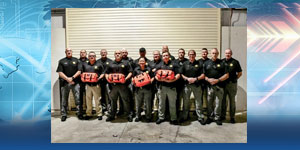Insurance Commissioner Urges North Carolinians To Prepare For Active 2025 Hurricane Season
RALEIGH – With hurricane season beginning Sunday, June 1, Insurance Commissioner Mike Causey urges residents to get ready now, as forecasters are predicting another extremely active season.
The National Oceanic and Atmospheric Administration (NOAA) forecasts 19 named storms, nine hurricanes and four major hurricanes for the 2025 Atlantic hurricane season, which runs through Nov. 30.
“North Carolina has seen the devastation hurricanes can cause firsthand,” Commissioner Causey said. “Last year, Hurricane Helene tore through our state, leaving behind massive damage and many people in western North Carolina are still recovering. Early preparation is critical to protect lives and property before a storm makes landfall.”
In September 2024, Hurricane Helene struck western North Carolina, bringing catastrophic flooding and destruction. The storm caused 107 deaths, destroyed thousands of homes, and caused nearly $60 billion in damage including roads, bridges and culverts.
Ahead of the 2025 hurricane season, Commissioner Causey is sharing the following tips to help residents be prepared before, during, and after a storm:
Before
Make sure you have adequate insurance coverage. Know exactly what your insurance policy covers. Homeowners’ policies do not cover flooding. Be aware there is a 30-day waiting period before flood policies take effect. If you rent, your landlord’s insurance only covers the building, not your belongings. You’ll need renters’ insurance to protect your personal items.
Compile important documents. Gather important paperwork, including insurance policies, medical records and prescriptions. Be prepared to bring copies with you if you are forced to evacuate your home. Know how to get in touch with your insurance agent and company.
Create a home inventory. Go room to room in your home and write down the brand name, description, estimated value and date of purchase of items in your home. It is also helpful to compile receipts, appraisal documents and serial numbers. Take videos or photographs of your belongings. Store your home inventory and related documents in a safe, easily accessible place online, on your smartphone, on your computer or in a fire-proof box or safe deposit box.
Identify potential hazards around your home. Hanging tree branches, loose shingles, patio furniture and other outdoor objects can cause damage or injuries in a storm. Make repairs or secure large objects to reduce the threat.
Check your emergency toolkit and to-go bag. Update items such as food, medicine and batteries. Make sure to include items for every member of your family, including pets.
Electricity may go out, so make sure you have extra drinking water. Also, fill the bathtub with water for bathing and flushing the toilet.
During
Shelter in place if officials advise it.
Stay away from windows, glass doors and skylights.
Find a safe place to stay in the interior of the home on a lower floor unless flooding is possible.
Make sure your cell phone is charged. Do not use a landline if lightning is present.
Turn off the electricity at the main breaker if flooding becomes a threat.
Remain indoors until officials give notice that it is safe to go outside.
If officials order an evacuation, do not come home until officials advise it is safe to do so.
After
Sadly, fraud is very common after a big storm. Commissioner Causey encourages storm victims to avoid roofing and contractor scams by only working with licensed and insured contractors. Our NCDOI Criminal Investigations Division has a staff of Special Agents who investigate insurance fraud daily.
Here are some things you should do immediately after the storm:
Contact your homeowners’ insurance agent or company to report the loss. Even if you have a separate windstorm or hail policy in addition to your homeowners’ policy, your primary homeowners’ insurer will investigate and adjust the claim even if you have wind or hail loss. Be patient as the insurer will likely be dealing with many claims.
Make a list of the damage and take clear pictures before you make any temporary repairs.
Do what you can to stop further damage from happening. For instance, place a tarp on your roof to prevent water from coming into the house. Keep receipts because your reasonable expenses to protect your property are part of the loss and may be reimbursed by your insurance company.
Do not make permanent repairs until your insurance company has inspected the damage and you have agreed on the cost of the repairs. Check with your insurance company before you dispose of damaged materials or items.
If your home is uninhabitable, check with your insurance company to determine which expenses will be reimbursed.
For more information on how to be prepared before, during and after any storm, visit www.ncdoi.gov/disaster or contact the NCDOI Consumer Services Division at 1-855-408-1212.
Discover more from JoCo Report
Subscribe to get the latest posts sent to your email.
7 Comments
Comments are closed.












Eh, why bother preparing if the government is going bail you out and give you free money! #StopTheWaste #BeResponsible
Oh yeah, all those people in Western NC were IRRESPONSIBLE for allowing a hurricane to dump over 20 inches of rain where they lived. I guess having a plan to be prepared in case something like this happens again, escape route, emergency food, cash, etc is irresponsible too.
#Maybeyou’llgetfloodedout
#StoptheStupid
They are being sarcastic
Whoosh…
@You’llNever: Believe me, I understand. My mountain home in Cashiers was heavily damaged. Even though insurance covered only 85% of cleanup and construction costs, I didn’t take any government handouts. Like strong, self-sufficient Americans (not snowflake SOCIALSTs), I used some of savings and sold some investments to pay the remaining costs. #StopSocialism #EndTheHandouts
Well good for you, you’re one of the lucky ones. But as typical TTT you missed the point of the article. The article wanted people to be prepare for a disaster that may happen. It had NOTHING to do with government help. Maybe if they are more prepared they wouldn’t need government help. Did you do anything to help your neighbors in distress?
@You’llnever: Part of being prepared is having enough insurance to cover your losses. All those people who MADE THE CHOICE not to have insurance are now whining that Trump denied the full FEDERAL HANDOUT that Gov Stien (and all snowflake, liberal SOCIALSTs) asked for. #BeResponsibleForYourself
@TTT Yep all those Snowflake Republican’t Dictators that control the NC General Assembly that passed $1.4 billion for hurricane relief just to but votes with your tax dollars. Again TTT get you facts straight.
Oh and I see you didn’t have any response to, Did you do anything to help your neighbors in distress?
#DUMPMAGANUTS